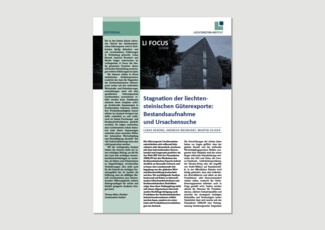Stagnation in Liechtenstein's goods exports: stocktaking and search for causes
The last few years made evident that global trade is exposed to risks. Examples include the long-running “trade war” between the USA and China, the coronavirus pandemic, supply chain problems, the war in Ukraine and attacks by Houthi militias on cargo ships. In the public debate, there are often calls for supply chains to diversify and move closer to the production or consumption location, which to some extent questions the globalization process. There are also increasing calls for protectionism, a more active industrial policy and self-sufficiency in strategically important raw materials and technologies. In fact, however, a slowdown or stagnation of the globalization process can be identified already since the 2008/09 financial crisis.
At the same time, only very weak growth in Liechtenstein’s exports of goods has been observed for around fifteen years: Liechtenstein’s exports of goods developed very dynamically for decades, in sync with international foreign trade and more positively than global GDP. Since the 2008/09 financial crisis, however, the growth of Liechtenstein's exports has clearly lost momentum and an increasing decoupling from the global economic development can be observed.
This LI Focus 2/2024 uses a broad international foreign trade data set at country and goods category level to discuss the reasons for the weak growth trend in Liechtenstein’s goods exports since the 2008/09 financial crisis in an international comparison. While the fact that globalization has clearly lost momentum since the financial crisis was certainly not conducive to Liechtenstein’s export economy, it cannot explain why Liechtenstein’s goods exports have developed worse than in other European countries in recent years. The sectoral composition of the export economy (primarily mechanical engineering and the metal processing industry) also does not appear to explain Liechtenstein’s long-term decoupling from global goods trade growth.
In contrast to goods exports, employment and especially value added in the industrial sector in Liechtenstein have developed positively. The available data suggest that the production capacities of Liechtenstein’s industrial companies were expanded significantly less in Liechtenstein than abroad and that this trend can be seen as the cause of the decoupling of Liechtenstein’s goods exports from global economic growth. During the same period, research and headquarter functions were expanded relatively strongly in Liechtenstein. This structural change was accentuated by the continuing upward trend of the Swiss franc and the resulting deterioration in international price competitiveness. Although the production of goods in Liechtenstein has increased less than abroad, this has led to positive cash flows back to Liechtenstein (e.g. from internal accounting of intermediate consumption or from profits generated abroad). This structural change is also reflected in the positive development of value added and foreign sales of Liechtenstein’s industrial companies compared to export figures.









